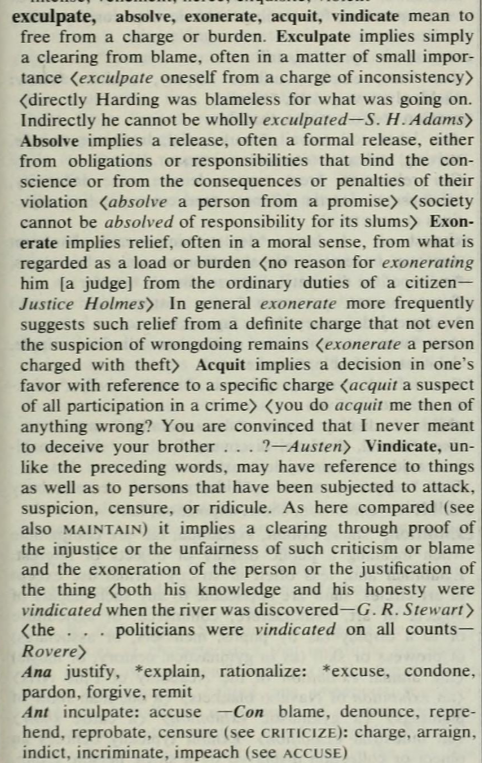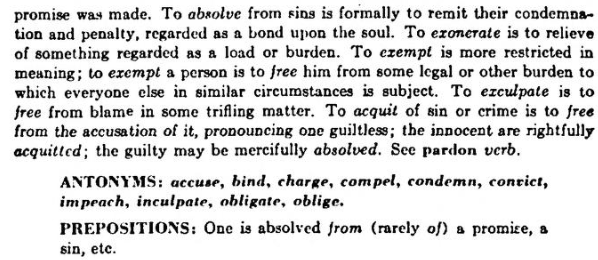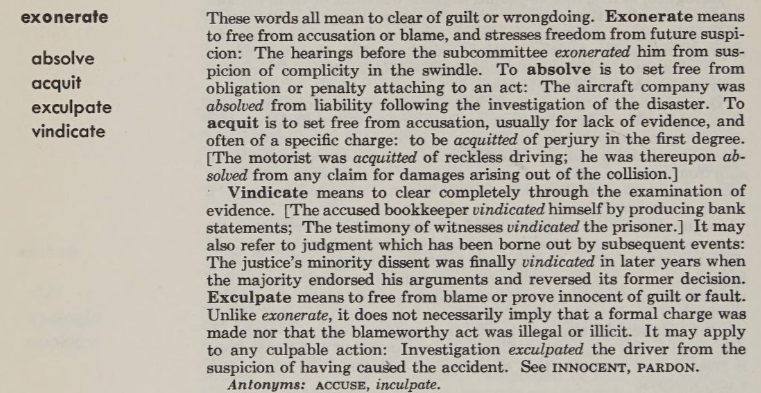Is there any dictionary or similar for comparing and contrasting related/synonym words, such as for ex. "swing" vs "sway", or "ask" vs "inquire"?
5 Answers
A very nice book which seems to be exactly what you want is the following:
Penguin guide to synonyms and related words
For a large number of words it analyses the nuances of the different synonyms.
To show you the book structure, I scanned an example page. You can see that for each key word there's a list of synonyms (the full word list can be found in the index at the end of the book), and for each synonym the text discusses its level of formality, its usage etc.
HARM
damage disable hurt incapacitate injure
These verbs all mean affect a person or thing in such a way as to lessen health. strength, value, beauty, and so on. Harm and damage are both wide in application. Harm refers to living things and, occasionally, to inanimate objects: afraid that in his rage he would harm the child: worried that her belongings might have been harmed. The point of harm, however, is that it can suggest any sort of negative outcome and thus is widely used in an abstract way, especially when an immoral or unethical impairment is at issue: those who unwittingly harm the cause of peace. Damage stresses impairment of value or function, and while it can be applied to living things, it is more commonly used to refer to inanimate objects. [Her heart was slightly damaged as a result of her long illness. The gale damaged several houses. The councillor damaged her chances for re-election by running an inept campaign.] Hurt, the most informal verb of the group, is mainly but not wholly restricted to living things and is general in applying to both a severe or minor impairment: a puppy that had been hurt by the tom cat; a few scratches, proving that children are bound to get hurt when they play, badly hurt in the car crash: a reputation hurt by an enemy's vicious hes. Injure is a slightly formal substitute for hurt. But while hurt concentrates more on the registering of a pain that need not override usefulness, injure often indicates at least a temporary loss of some function: continuing to type as fast as ever, though he had hurt his fingers while repairing his truck; a bird that hopped about helplessly as if one of its wings had been injured. Disable and incapacitate both intensify suggestions of injure in pointing more definitely to a temporary or permanent loss of function. Of the two, disable is more likely to suggest a partial impairment, perhaps permanent, but one that need not affect usefulness: serving as president, although disabled by polio. Incapacitate, by contrast, is more formal and tends to suggest total loss of function or effectiveness: the tragedy of an active person who had been incapacitated by a stroke. Both disable and incapacitate, however, go beyond the previous pair in their application to inanimate things: its retro-rockets disabled by a mistire during blast-off; snow-clogged roads that would incapacitate any car not equipped with tyre chains. See HURT, WEAK.
Antonyms: REPAIR.
-
Looks like a good find. Do you have a copy with you? Can you quote an example like 1006a did? Does it come in an online version as well?– NVZ ModCommented Aug 13, 2017 at 3:03
-
1@NVZ Yes, I have a copy, and I'll quote an example in a couple of weeks when back from vacations. I'm not aware of any online version. Commented Aug 13, 2017 at 3:50
-
@NVZ Have a look at the edit: I preferred to scan a page to give a better idea of the structure. Commented Aug 20, 2017 at 16:09
-
I'm looking at it. It's nice. You already have my upvote. :)– NVZ ModCommented Aug 20, 2017 at 16:10
The best dictionary of synonyms is the (possibly out of print) 1984 Webster's Dictionary of Synonyms (942 small-type pages), not to be confused with the much more popular (but not as thorough) The Merriam-Webster Dictionary of Synonyms and Antonyms (1994, 448 larger-font smaller pages).
Both books offer closely-related synonyms in a single entry (such as "exculpate, absolve, exonerate, acquit, vindicate") featuring:
- Common meaning
- How each word deviates from the common meaning
- Sample phrase for each word
The latter book also has the antonym for each word while the former book lists the antonyms / contrasted words for each word group. The former book has these features that the latter book doesn't have:
- analogous words with closely similar meaning
- quotations from "outstanding writers" such as Jane Austen and Charles Dickens
It appears that the Merriam-Webster.com website includes most of the latter book's definitions, under its "Synonym Chooser" section (example: exculpate). So, make sure to check the "Synonym Chooser" section when it is available for a particular word.
@SvenYargs pointed out the precursors of both books's format (I changed the links in the comment to archive.org):
Another excellent source of discussions that distinguish the nuances of similar words is S. I. Hayakawa, Choose the Right Word, which is to some extent an update of Funk & Wagnalls Standard Handbook of Synonyms, Antonyms, and Prepositions, which went through dozens of editions from the late 1800s to 1947. Both Merriam-Webster's Dictionary of Synonyms (which debuted in 1942) and Hayakawa's book follow the format that F&W pioneered.
Here's a sample entry from the 1994 Merriam-Webster's book (courtesy of Amazon sample page):
exculpate, absolve, exonerate, acquit, vindicate mean to free from a charge or burden.
- Exculpate implies a clearing from blame or burden <I cannot exculpate myself of the charge of overenthusiasm>. ant accuse
- Absolve implies a release either from an obligation that binds the conscience or from the consequences of its violation <absolved the subject from his oath of allegiance>. ant hold (to), charge (with)
- Exonerate implies a complete clearance from an accusation or charge and from any attendant suspicion of blame or guilt <a committee exonerated the governor from charges of bribery>. ant incriminate
- Acquit implies a decision in one's favor with respect to a definite charge <acquitted of murder by a jury>. ant convict
- Vindicate may refer to things as well as persons that have been subjected to critical attack of imputation of guilt, weakness, or folly, and implies a clearing through proof of the injustice or unfairness of such criticism or blame <an investigation vindicated the senator on all counts>. ant calumniate
Here's the corresponding entry from the 1984 Webster's book (courtesy of archive.org):
Here's a similar entry (under ABSOLVE) from the 1947 edition of Funk & Wagnalls book page 9 and 10:
Finally, here's a similar entry (under EXONERATE) from S.I. Hayakawa's book page 202 (1968):
Online, Merriam-Webster often has a "Synonym Discussion" under its Dictionary entries that directly compares and contrasts selected synonyms. For example, under the entry for swing it says in part
SWING implies a movement of something attached at one end or one side. ⟨• the door suddenly swung open⟩ SWAY implies a slow swinging or teetering movement. ⟨• trees swaying in the breeze⟩
You'll need to scroll down past the definition-proper, examples, and etymology to get to this discussion, and not every entry has it. Note that M-W also has a Thesaurus tab, which takes you to a more traditional list of synonyms.
Off-line, many print thesauruses include similar kinds of discussion. Your local library or bookstore likely has a selection of these that you could browse.
Try WordHippo, I think it's awesome.
Its definitions may not be as professional as those of standard dictionaries, but it gives synonyms for each meaning of the word. You can find real examples of sentences where the words are used. It also gives you antonyms and other word forms (nouns, verbs, adjectives with the same root). It's a wondrous tool. Downside: not many idiom synonyms.
Second favourite: PowerThesaurus. This one will give you idiom synonyms, but for words it is less detailed.
-
1I love WordHippo, but its synonyms are "wide", so you do have to know your vocabulary and/or look up each synonym. I find its best use is to put ideas in front of me. Commented Sep 11 at 10:13
-
@WeatherVane Exactly my thought. I am always using it, but in combination with standard dictionaries like OED, Cambridge etc.– fevCommented Sep 11 at 10:34
My personal choices for synonym-related dictionaries are:
www.merriam-webster.com/thesaurus/
-
2Hello, kartoniks. Does any of these go beyond merely providing a list of words which may be interchanged in certain situations? Would they for example explain any slight differences in meaning / connotation between the words 'abstruse' and 'recondite'? Commented Aug 11, 2017 at 12:54
-
Thesaurus.com does grade closeness, offer definitions, and provide example sentences, but it doesn't offer any usage information: you have to work that out for yourself. Merriam-Webster's thesaurus provides similar material to its dictionary. I'm not familiar with synonym.com but it's owned by Leaf Group who're a content farm-type business trying to snag Google search results according to Wikipedia, and while they have a lot of data its provenance or accuracy is unclear.– Stuart FCommented Oct 8 at 16:26




